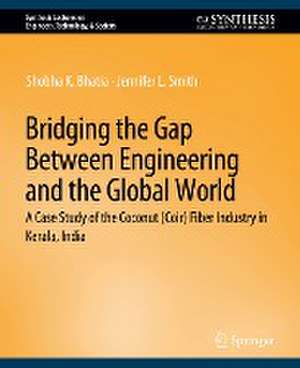Bridging the Gap Between Engineering and the Global World: A Case Study of the Coconut (Coir) Fiber Industry in Kerala, India: Synthesis Lectures on Engineers, Technology, & Society
Autor Shobha K. Bhatia, Jennifer L. Smithen Limba Engleză Paperback – 9 iun 2008
Din seria Synthesis Lectures on Engineers, Technology, & Society
-
 Preț: 336.85 lei
Preț: 336.85 lei -
 Preț: 264.97 lei
Preț: 264.97 lei -
 Preț: 454.53 lei
Preț: 454.53 lei -
 Preț: 207.83 lei
Preț: 207.83 lei -
 Preț: 211.08 lei
Preț: 211.08 lei -
 Preț: 206.29 lei
Preț: 206.29 lei -
 Preț: 263.82 lei
Preț: 263.82 lei -
 Preț: 261.91 lei
Preț: 261.91 lei -
 Preț: 208.41 lei
Preț: 208.41 lei -
 Preț: 191.31 lei
Preț: 191.31 lei -
 Preț: 351.41 lei
Preț: 351.41 lei -
 Preț: 191.31 lei
Preț: 191.31 lei -
 Preț: 191.31 lei
Preț: 191.31 lei -
 Preț: 191.31 lei
Preț: 191.31 lei -
 Preț: 191.31 lei
Preț: 191.31 lei -
 Preț: 173.13 lei
Preț: 173.13 lei -
 Preț: 211.67 lei
Preț: 211.67 lei -
 Preț: 173.13 lei
Preț: 173.13 lei -
 Preț: 191.31 lei
Preț: 191.31 lei -
 Preț: 234.87 lei
Preț: 234.87 lei -
 Preț: 191.31 lei
Preț: 191.31 lei -
 Preț: 298.62 lei
Preț: 298.62 lei -
 Preț: 291.69 lei
Preț: 291.69 lei - 20%
 Preț: 358.70 lei
Preț: 358.70 lei -
 Preț: 290.92 lei
Preț: 290.92 lei
Preț: 173.13 lei
Nou
Puncte Express: 260
Preț estimativ în valută:
33.13€ • 34.46$ • 27.35£
33.13€ • 34.46$ • 27.35£
Carte tipărită la comandă
Livrare economică 10-16 aprilie
Preluare comenzi: 021 569.72.76
Specificații
ISBN-13: 9783031799426
ISBN-10: 3031799429
Ilustrații: VIII, 58 p.
Dimensiuni: 191 x 235 mm
Editura: Springer International Publishing
Colecția Springer
Seria Synthesis Lectures on Engineers, Technology, & Society
Locul publicării:Cham, Switzerland
ISBN-10: 3031799429
Ilustrații: VIII, 58 p.
Dimensiuni: 191 x 235 mm
Editura: Springer International Publishing
Colecția Springer
Seria Synthesis Lectures on Engineers, Technology, & Society
Locul publicării:Cham, Switzerland
Cuprins
Reinforcing the Classroom.- Natural Plant Fibers for Engineering Applications: Technocentric and Ecocentric Dimensions of Sustainability.- The Coir Fiber Industry in Kerala, India: Sociocentric Dimension of Sustainability.- Case Study.- Conclusion.- Bibliography.
Notă biografică
Shobha K. Bhatia is Laura J. and L. Douglas Meredith professor and professor of civil and environmental engineering at Syracuse University in Syracuse, New York. She has made significant contributions to both engineering research and engineering education. Her engineering research has focused on the application of geosynthetics and natural materials in waste containment, road and building construction, and erosion control. She has more than 80 publications; has received funding from the National Science Foundation (NSF), the United States Environmental Protection Agency (USEPA), the New York State Department of Transportation (NYSDOT), and many other private organizations; has participated in national and international conferences; and has served in numerous capacities, such as vice president of the North American Geosynthetics Society (NAGS), member of the Technical Coordination Council (TCC), and member of the International Activity Council of the Geo-Institute of the American Society of Civil Engineers (ASCE). She has also been extensively involved in engineering education. She is codirector of the Women in Science and Engineering (WISE) initiative at Syracuse University. She has also been part of national initiatives to increase the number of women in leadership positions in academia through her projects funded from the NSF ADVANCE program. She played an important role in the NSF-funded Engineering Education Scholar Program, which was designed to prepare young faculty for academic careers. She is also the recipient of a NSF Faculty Achievement Award for Women for excellence in research and leadership in training future engineers and has received several national and international awards, including the International Network for Engineering Education and Research (iNEER) Award for Excellence in Fostering Sustained and Unique Collaborations in International Research and Education.Jennifer Smith is an assistant professor of construction management and wood productsengineering at the State University of New York College of Environmental Science and Forestry (SUNY-ESF) in Syracuse, New York. She recently completed her MA degree in public administration from the Maxwell School of Syracuse University and a PhD degree in civil engineering from Syracuse University. Her engineering research has focused on characterizing geotextiles for use in filtration applications and the fundamental properties and performance of sustainable natural fibers, such as wood, straw, coconut, and jute for erosion control. In addition to taking courses in environmental economics and policy, her policy research has focused on the social impacts of natural fiber use, in particular how globalization can be used to create opportunities and sustain women coir workers in Kerala, India. She has more than 20 publications, several of which have received awards, and is a member of the American Society of Civil Engineers (ASCE) Geo-Institute Committee on Geotechnics of Soil Erosion and the North American Geosynthetics Society (NAGS). She has 8 years of experience as a geotechnical engineer for local engineering firms and is a licensed professional engineer in New York. She currently teaches courses in sustainable construction and construction management.
